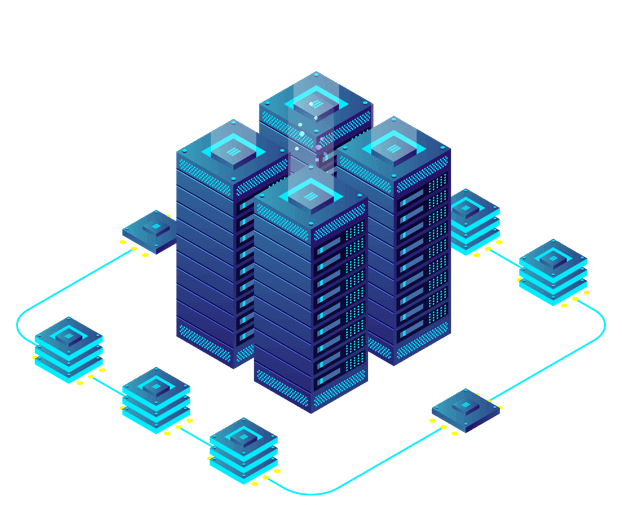Devologic3 develops customized applications for demanding private, public, and governmental clients.
Devologic3 is a forward-thinking company specializing in cutting-edge technologies, including blockchain, artificial intelligence for auditing, and complex applications. With a strong commitment to innovation and a track record of excellence, Devologic3 is at the forefront of developing and implementing solutions for a wide range of clients, including private businesses, public organizations, and government agencies.
Their expertise in blockchain technology ensures secure and transparent data management, while their advanced AI solutions revolutionize the auditing process, making it more efficient and insightful. Moreover, they excel in creating intricate and tailor-made applications that meet the specific needs of their clients. Devologic3 is your trusted partner for harnessing the power of these emerging technologies to drive growth and success in today's dynamic business landscape.

Main problems of the
Blockchain Technology
-
Scalability:
Scalability is a persistent issue in blockchain networks. As the number of users and transactions increases, some networks can become slow or inefficient.
-
Privacy and anonymity:
While blockchain is transparent, privacy and anonymity are often required in certain transactions, which can be a challenge.
-
Interoperability:
Interoperability between different blockchains is a challenge. Blockchains are often independent and do not easily communicate with each other.
Our solution
Encompass a range of strategies to address key challenges in blockchain technology. To enhance scalability, we implement more efficient consensus algorithms, favoring Proof of Stake (PoS) over Proof of Work (PoW), and leverage layer 2 solutions like state channels and sidechains. Moreover, privacy concerns are effectively mitigated through the utilization of cutting-edge privacy-preserving technologies and advanced mixing techniques.
In our commitment to seamless interoperability, we actively participate in the development of industry-specific standards and protocols, including collaborations with organizations like the Interledger Alliance. These measures ensure the integrity and performance of our blockchain solutions while fostering a secure and interconnected digital landscape.
Common problems with
Artificial Intelligence
-
Data bias:
Artificial intelligence algorithms can perpetuate biases present in the data they are trained on, resulting in discriminatory decisions.
-
Lack of transparency:
AI models are often black boxes, making it difficult to understand how they make decisions.
-
Data privacy:
The collection and use of personal data in AI applications raise concerns about privacy
Our solution
In our technology development company, we employ several strategies to address challenges associated with artificial intelligence. To combat data bias, we implement rigorous data preprocessing and cleansing, alongside the application of bias mitigation techniques and model auditing for identifying and rectifying potential biases. Additionally, we prioritize transparency by focusing on the development of AI models that offer enhanced interpretability and explainability.
For data privacy concerns, we ensure compliance with relevant regulations, such as the European Union's General Data Protection Regulation (GDPR), and utilize advanced anonymization techniques and federated learning methods. These measures guarantee responsible and ethical AI practices while maintaining the security of sensitive data.
Decentralized infrastructure
In our company, we specialize in crafting decentralized frameworks for blockchain and Web3, advancing innovation and trust
SCAM detection
Incorporating audits and robust security protocols to detect and prevent blockchain scams, safeguarding operations.
Fund Administration
Utilize blockchain technology for secure fund management, employing robust security measures to safeguard against theft and hacking threats including multi-factor authentication, cryptographic encryption, and regular security audits.
IA & much more
Artificial intelligence applied to blockchain involves using AI algorithms and models to enhance security, efficiency, and decision-making capabilities within blockchain networks. This may include pattern detection, process optimization, and task automation, thereby strengthening the utility of blockchain technology across various applications.Dapps & App development, Tokenization and Crypto project structures.
Devologic3 Services
Web3 & Blockchain
We believe it is incredibly important to redistribute this power & profitability, and hand it back over to the people - the real consumers, borrowers and lenders.
Protocols
Creating private communication protocols for blockchain ensures secure, confidential data exchange, safeguarding transactions and user privacy.
Dapps
For our company, developing DApps (Decentralized Applications) involves creating innovative and secure blockchain-based solutions, enabling efficient, trustless interactions in a decentralized ecosystem.
Tokenization
Our regulated tokenization service, in compliance with the European Community, offers companies a secure platform to digitize assets, ensuring transparency and efficiency in financial transactions.
CryptoBank, Dex & Cex Exchanges
At our company, we specialize in developing both decentralized and centralized crypto banks and exchanges. Our solutions empower seamless and secure cryptocurrency trading and financial services, combining cutting-edge technology with regulatory compliance to ensure the utmost trust and efficiency in the digital finance landscape.
Payment Gateway
In our development of a crypto payment gateway, we create a robust, user-friendly solution that facilitates seamless cryptocurrency transactions, enabling businesses to accept digital payments with ease and security with own cryptowallet.
Frequently
asked questions
Devologic3 is a forward-thinking company specializing in cutting-edge technologies, including blockchain, artificial intelligence for auditing, and complex applications. With a strong commitment to innovation and a track record of excellence, Devologic3 is at the forefront of developing and implementing solutions for a wide range of clients, including private businesses, public organizations, and government agencies.
Using blockchain technology and Web3 for your company can provide a wide range of benefits, enhancing their experience and the overall value your business can offer. Here's a description of why you should consider these technologies: Blockchain technology has revolutionized various industries, and its application can greatly benefit your clients. Here's why: Enhanced Security: Blockchain's decentralized ledger ensures that data is secure and immutable. This is particularly valuable for clients dealing with sensitive information, financial transactions, or digital assets. Transparency: The transparent nature of blockchain ensures that all transactions and interactions are recorded and can be audited by all involved parties. This fosters trust and reduces fraud. Reduced Intermediaries: By eliminating intermediaries in transactions, clients can save on fees and expedite processes. This is particularly advantageous for cross-border transactions and supply chain management. Smart Contracts: Smart contracts, built on blockchain, automate and enforce contract terms without the need for intermediaries. This streamlines processes, reduces the risk of disputes, and accelerates execution. Decentralization: Web3 technologies build on blockchain's decentralization, reducing the control of centralized entities. This empowers clients by giving them more control over their data and digital assets. Data Ownership: Web3 principles emphasize data ownership and control. Clients can have ownership of their personal data, and they can choose how and with whom to share it, enhancing privacy and security. Interoperability: Web3 aims for cross-platform compatibility, ensuring that clients can seamlessly use services across various applications and platforms without friction. Distributed Applications (dApps): Developing decentralized applications allows clients to enjoy services with reduced downtime and the assurance that their data isn't stored on a single server vulnerable to outages or attacks. Tokenization: Utilizing blockchain for tokenization can represent physical or digital assets, allowing clients to easily trade and manage assets like real estate, stocks, or digital collectibles. Community and Governance: Web3 technologies promote community involvement and decentralized governance, ensuring clients have a say in the development and direction of the platforms and services they use. By implementing blockchain and Web3 technologies, your company can offer a more secure, transparent, and efficient experience for your clients. These technologies provide the tools for clients to have greater control over their data, finances, and digital assets while fostering trust and reducing the costs associated with traditional intermediaries. It's a transformative approach to doing business that can set your company apart in a world where digital security and decentralization are becoming increasingly important.
Security Protocols: Security protocols are a set of standardized procedures and mechanisms designed to safeguard computer systems, networks, and data from unauthorized access and cyber threats. They encompass various measures such as encryption, access control, and authentication methods to ensure the confidentiality, integrity, and availability of sensitive information. Auditing Protocols: Auditing protocols are procedures and guidelines for examining and evaluating the security and compliance of IT systems and operations. They involve systematic reviews, assessments, and log analysis to identify vulnerabilities, detect irregularities, and verify adherence to security policies and regulations. Hacker Defense Protocols: Hacker defense protocols are strategies and technologies aimed at protecting digital assets and networks from cyberattacks and unauthorized intrusion attempts. These include firewall systems, intrusion detection and prevention systems (IDPS), regular security patches, and incident response plans to mitigate the impact of hacking incidents. These protocols collectively form a crucial part of an organization's cybersecurity framework, helping to secure data, systems, and networks while also ensuring ongoing compliance with industry regulations and best practices.
Data protection is a critical aspect of ensuring the privacy and security of sensitive information within applications. It involves a range of measures to safeguard data from unauthorized access, breaches, or misuse. These measures can include: Encryption: Implementing strong encryption algorithms to protect data both in transit and at rest, making it unreadable without the correct decryption keys. Access Control: Setting up access permissions and user roles to restrict data access to authorized personnel only, ensuring that sensitive data is only available to those who need it. Data Masking/Tokenization: Redacting or tokenizing sensitive information to protect personally identifiable information (PII) while retaining the usability of the data. Regular Auditing: Conducting regular audits and security assessments to identify vulnerabilities and maintain data security standards. Data Retention Policies: Establishing guidelines for how long data should be stored and when it should be securely deleted or archived. User Education: Educating users and clients about the importance of data security and best practices for maintaining data protection. Data Breach Response: Developing and testing response plans for data breaches to minimize damage and ensure compliance with data protection regulations. Anonymous Development: Anonymous development is an approach that focuses on preserving the anonymity and privacy of users and clients within an application. This can include the following practices: End-to-End Encryption: Implementing end-to-end encryption to ensure that only the sender and receiver of messages or data can decrypt and access the information. Anonymous User Profiles: Allowing users to interact with the application without revealing their real identities, using pseudonyms or other anonymous identifiers. No Data Collection: Minimizing the collection of unnecessary user data and avoiding the creation of comprehensive user profiles. Privacy-First Design: Building applications with a privacy-first mindset, so that anonymity and data protection are central to the application's architecture. Anonymous Payments: Providing options for users to make anonymous payments or transactions, such as with cryptocurrencies. Secure Communication: Ensuring that all communication channels, including messaging and data sharing, are secured and protected to prevent leaks or unauthorized access. Both data protection and anonymous development are essential for applications that prioritize user privacy and security. These practices not only help build trust among your clients but also ensure compliance with data protection regulations, which are becoming increasingly important in today's digital landscape.











